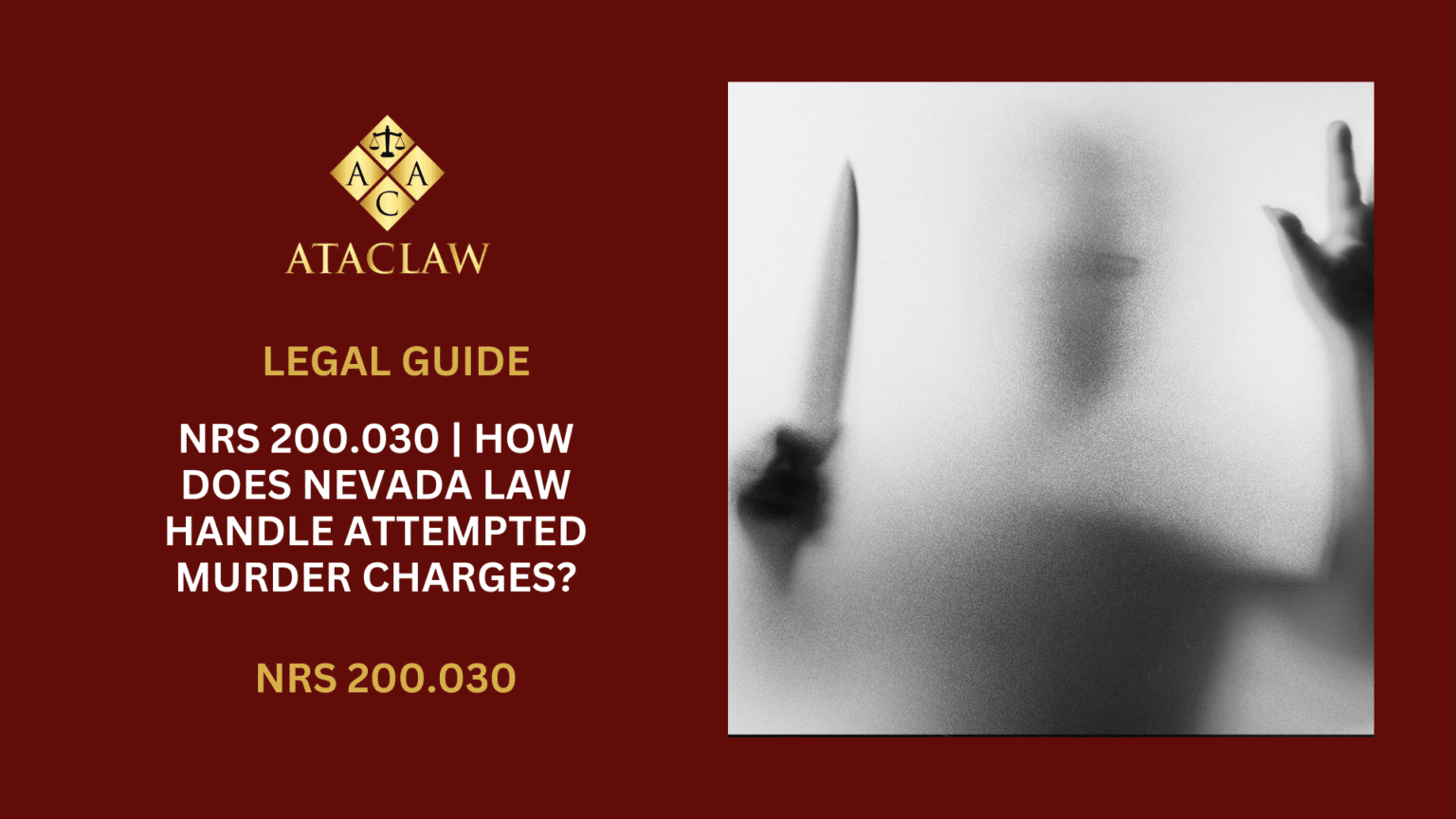In the eyes of Nevada law, attempted murder is a serious offense with potentially grave consequences. Defined under NRS 200.030, the crime involves an unsuccessful attempt to end another human being’s life. Understanding the complexities of this charge is crucial for anyone navigating the legal system. ATAC LAW is here to provide clear, actionable insights into the workings of Nevada’s laws on attempted murder, the possible penalties, defense strategies, and the impact on one’s future.
What Constitutes Attempted Murder in Nevada?
In Nevada, the essence of attempted murder lies in the intent and effort to take someone’s life without success. This means that for the authorities to establish a case of attempted murder, they must demonstrate:
- The perpetrator’s clear intention to end the life of the intended victim.
- The undertaking of at least one definitive action aimed at achieving the fatal outcome.
- The survival of the intended victim, despite the assailant’s efforts.
This distinguishes attempted murder sharply from murder itself, where the distinguishing factor is the survival of the victim. Situations that typify attempts at murder might involve:
- Firing a weapon aimed at vital parts of someone’s body like the head or heart, hoping to be fatal, yet the intended target avoids harm in time.
- Inflicting potentially deadly wounds through stabbing, with the expectation of causing death, only for the victim to recover.
- Contracting a third party to execute a murder, which ultimately fails as the intended target manages to elude the situation.
Should the victim succumb to their injuries, the charges escalate from attempted murder to murder, implicating dire legal consequences such as life imprisonment or the possibility of facing the death penalty.
What are the Sentencing Guidelines for Attempted Murder in Nevada?
In the state of Nevada, engaging in attempted murder is classified as a category B felony. For those found guilty, the law mandates a prison sentence that can range from a minimum of two years to as much as 20 years within the confines of state prison facilities. However, certain circumstances surrounding the crime can lead to more severe penalties, specifically when:
- The perpetrator utilized a deadly weapon during the commission of the crime,
- The act was carried out with the intent to further gang activities, or
- The victim was 60 years of age or older.
Under such conditions, the court has the authority to extend the prison sentence by an additional one to 20 years. Nonetheless, this augmented sentence cannot surpass the duration of the primary sentence for the attempted murder charge.
To illustrate, consider the case of Ben, who was found guilty of attempting to take the life of his 65-year-old friend. The judge decides on a base prison term of 10 years for the attempt on the friend’s life. Given the victim’s age, a sentence enhancement is applicable. But, since the baseline sentence is 10 years, the extended penalty cannot exceed this duration, thereby creating a potential maximum of up to 20 years in total.
On the other hand, had the base sentence been the full 20 years, the judge could impose an additional 20 years for the age of the victim, effectively doubling the sentence due to the circumstances.
It’s important to note that the charge of attempted murder does not include the possibility of a death penalty. Moreover, in specific scenarios, the court may consider granting probation as an alternative to incarceration, depending on the details and complexities of each case.
The variety in sentencing reflects the seriousness with which Nevada treats attempts on human life, further emphasizing the necessity for robust legal defense and a comprehensive understanding of the legal system for individuals facing such charges.
Attempting to Cause Death via Poisoning in Nevada
Under the statutes of Nevada, if someone tries to cause another person’s death through poisoning, this act is deemed a category A felony. Depending on the case specifics, the sentencing for this crime can vary significantly, and may include:
- A life sentence with the chance for parole eligibility after serving 5 years, OR
- A fixed term of 15 years with parole eligibility also after a period of 5 years.
This highlights the severity with which the Nevada legal system treats attempts on life through such a method, underscoring the potential for substantial prison time for those found guilty of this offense.
Can Non-Citizens Facing Attempted Murder Charges Avoid Deportation in the U.S.?
Non-citizens found guilty of attempted murder may face expulsion from the United States. By law, murder, including attempted murder, is categorized under two critical classifications that can lead to deportation:
- A crime involving moral turpitude,
- An aggravated felony.
These categories make individuals convicted of such offenses eligible for deportation. However, immigrants charged with attempted murder have potential legal pathways to prevent removal from the U.S. Successful defense strategies could involve either:
- Achieving a dismissal of the criminal case,
- Bargaining the charges down to a lesser offense that does not carry the weight of deportability.
It’s pivotal for immigrants to consult with a knowledgeable attorney who understands the intersection of criminal and immigration law. A skilled lawyer can navigate the legal system to argue for case dismissal or a reduction in charges that removes the threat of deportation, offering a chance to remain in the U.S. despite serious allegations.
Can You Fight Against Attempted Murder Charges in Nevada?
Fighting attempted murder charges in Nevada presents its own set of challenges, often more complex than in cases of actual murder. Without a victim’s death to show and with the accused’s intent under scrutiny, proving such a charge becomes a rigorous task for prosecutors.
Several defense strategies can be employed to aim for a dismissal of attempted homicide charges, including self-defense, disputing the intention to kill, and contesting the actual attempt. It’s crucial to note that not causing physical harm to the victim does not serve as a defense against these charges.
Self-Defense as a Legal Justification
In Nevada, using lethal force in self-defense is permissible under law, should you reasonably believe there’s an imminent threat of being killed or severely injured by an aggressor. This premise applies to protecting oneself or another person from harm.
The Significance of Intent in Attempted Murder
Being charged with attempted murder necessitates that the accused had a clear intention to end a life. It’s a crime that requires specific intent, which means the mere desire to injure someone isn’t enough to be convicted of attempted murder. Evidence such as surveillance footage, eyewitness statements, or digital communications can play a pivotal role in these cases. Arguments made by the prosecution regarding injuries inflicted, especially in vital areas, can suggest premeditation; however, actions like firing a weapon away from a person might undermine claims of lethal intent. Ultimately, lack of demonstrable intent to kill absolves the accused of an attempted murder charge, contingent on prosecutorial proof.
The Definition of an Attempt
Merely contemplating or preparing for a murder doesn’t constitute an attempted crime. An attempt involves taking a substantial step toward completing the act. Journaling about a desire to kill doesn’t meet this threshold, whereas brandishing a firearm at someone might. However, planning a murder with one or more individuals could lead to charges of conspiracy to commit murder, even if the plan wasn’t executed.
It’s important for individuals facing such accusations in Nevada to understand these nuances and seek competent legal guidance. The intricacies of intent, self-defense, and the nature of an “attempt” form the crux of potential defenses against charges of attempted murder, opening avenues to challenge the prosecution’s case effectively.
Can Attempted Murder Convictions in Nevada Be Sealed?
Having a criminal record can have significant long-term impacts on various aspects of your life. If you have a conviction for attempted murder in Nevada, you may be eligible to have your record sealed. The criteria for eligibility start with a waiting period of ten years from the point at which the case is considered closed, which is when you have completed any imposed sentence and parole requirements.
If you’re acquitted of attempted murder charges, or if the charges are dismissed, the opportunity to seal your record arises much sooner. In fact, you can initiate record sealing proceedings immediately in such circumstances. This process is outlined in the state’s regulations on record sealing, providing a legal avenue for individuals to clear their names and move forward with fewer obstacles related to their past criminal charges.
Don’t let the weight of criminal charges dictate your future. Reach out to ATAC LAW today to discuss your case with our skilled criminal defense attorneys and discover how we can assist you in turning the page toward a brighter future.
For further legal assistance and to discuss your case with an expert, don’t hesitate to contact ATAC LAW.




